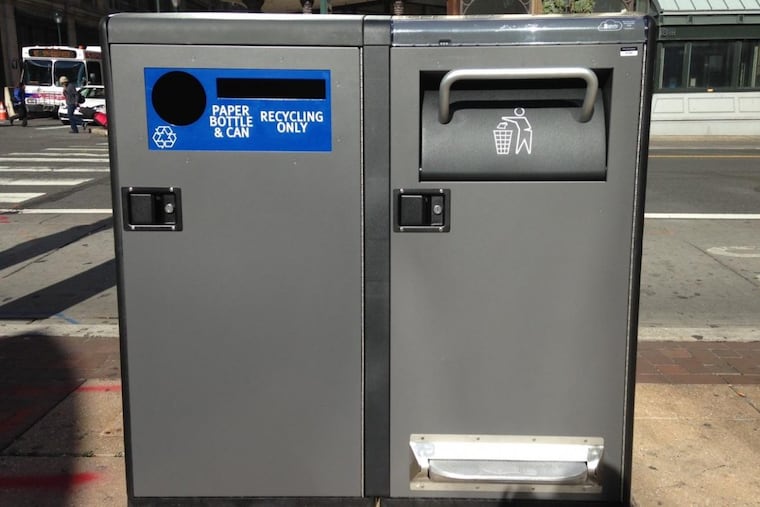Philly getting new, germaphobe-friendly street trash compactors
The new trash cans have pedals, eliminating the need to touch dirty handles

Here's trashy — but feel-good — news for Philadelphia's germophobes.
Fancy new garbage compactors that have foot pedals — instead of just handles — to throw out your trash are appearing around the city. They're replacing the old, sometimes broken, compactors that had only handles, prompting trepidation from those wary of touching something potentially unsanitary. This was especially true when garbage overflowed.
"I love it because you don't have to touch it," said Sophia Wilson, who gently stepped on the pedal to make a small trash deposit around noon Wednesday at Eighth and Market Streets in Center City. She and coworker Angela Washington were visiting from Atlanta for the week.
"You don't have to worry about germs and bacterial sanitizer," Washington said. The two work in a hospital setting, where they are particularly conscious of keeping their hands clean.
The original $3,700 compactors, manufactured by Bigbelly Inc. of Massachusetts, arrived in waves starting in 2009 with promises of a cleaner city that would save money long term. Previously, trash was to be thrown in wire-mesh baskets.
Jean Magola of North Philadelphia was rushing to her job when she tossed a cup in the recycling receptacle with open holes for bottles, cans, and paper. She, like others, did not notice the new compactor but was glad to hear about the replacements, which she hopes will reduce the overflow. Minutes later a passerby threw his trash on the sidewalk, and then a boy dropped some food on the ground. His mother instructed him to leave it.
"That's the kind of behavior we're trying to change," said Streets Commissioner Carlton Williams. In the meantime, Center City District workers also were busy at Eighth and Market sweeping up the messes along with cigarette butts and random litter.
The new compactors started arriving in Center City on Monday and will continue to be put in place in the weeks to come. About 40 will be installed at locations where construction work is underway, Williams said.
The state-of-the-art compactors — old and new — have solar panels on top and sensors that message collectors when filled.
In the fantasy trash world, it would take only one sanitation worker to remove the garbage and reline the receptacle. Because these are compactors, the garbage was crushed to make room for five times the amount of trash that wire-mesh cans could hold, so these would not have to be emptied as often.
In the real world, some residents and city workers started sounding like Oscar the Grouch. It often took two workers, not one, to lift the heavier load that overflowed at times because the sensors were not working, or the compactor mechanism needed repair. The overflow was disgusting and the receptacle surfaces became the new canvas for graffiti artists.
City Controller Alan Butkovitz issued a report in 2010, and a followup in June, that concluded the city did not achieve the long-term savings it predicted, and the compactors created problems, such as maintenance, that was costly.
Williams agrees the compactors did not result in the $875,000 a year in savings that had been expected, because the city had to pay for maintenance. Still, he said, there was a $650,000 savings each year because trash pickup was reduced from 17 times a week to 3.5 times in Center City. That allowed a staff reduction from 33 workers to 11.
In an interview Wednesday, Butkovitz said the $100 mesh cans did not need improvement.
"You could not conceive of a simpler design of a trash receptacle than a mesh can that needs to be emptied once a week," Butkovitz said, saying a return to the mesh cans could help the city cut its losses. "I think the city initially made a bad deal and they can't go back in the time machine and get rid of it."
Based on earlier reports of the new compactors, there is an apparent plus besides the foot pedal.
In June, the city signed a contract with Green City Solutions LLC to pay for 275 new receptacles, which now cost $4,800, and provide maintenance for the compactors in exchange for advertising rights. The city, in turn, gets 5 percent of the advertising revenue that can be used to maintain older compactors, including refurbishing 125 to look like new. Those, Williams said, will not have pedals.